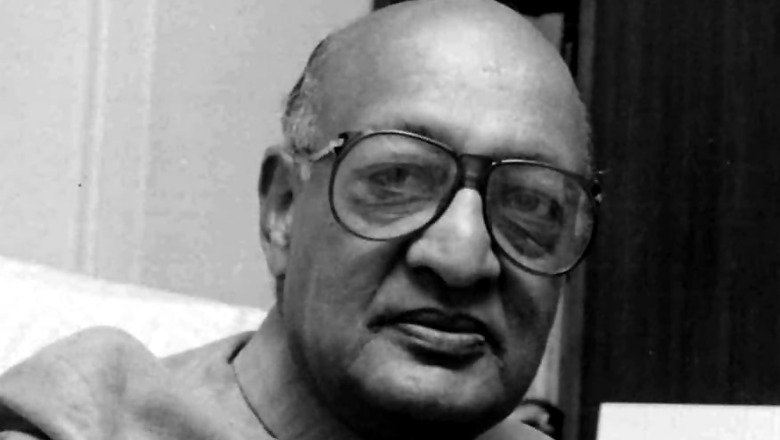
views
The Bajaj family has a history of getting embroiled in political slugfests.
Many moons ago, in May 1976, Rahul Bajaj’s uncle and freedom fighter Ramkrishna Bajaj had found himself at the receiving end of Sanjay Gandhi’s political ambitions. Ramkrishna, son of legendary industrialist Jamnalal Bajaj, had spent four years in British jail from 1942 to 1946 for responding to Mahatma Gandhi’s Quit India movement.
Ramakrishna, who loved to describe himself as ‘Mahatma Gandhi’s coolie’, was constantly harassed throughout the 21 month-long Emergency, during which Sanjay and his team, consisting of Vidya Charan Shukla, Om Mehta and Ambika Soni, tried to wrest control of the Vishwa Yuvak Kendra, an apolitical youth training and development centre in the heart of Delhi.
Ramkrishna faced massive income tax raids and was forced to prevail upon fellow Gandhian Vinoba Bhave to call off his fast unto death against cow slaughter.
Ramkrishna, never a man to take quick offence, sought help from then PM Indira Gandhi with whom he had enjoyed a childhood friendship, and from Nehru-Gandhi family retainer Mohammad Yunus. But the harassment did not end. Ramkrishna realised slowly that his harassment was a deliberate policy to browbeat the Bajajs into submission.
On August 30, 1975, Ramkrishna, who was a director of the Vishwa Yuvak Kendra, received a requisitioned order from the Delhi administration, seeking to take possession of the Kendra. Ramkrishna checked with his friends in the Congress about why the government was trying to take control of the Kendra. He learnt that Sanjay wanted the Kendra building, which had a well-furnished hostel, for the Youth Congress.
A lengthy communication with the then home minister Brahmanand Reddy followed, but his plea fell on deaf ears. Shukla advised Ramkrishna to resign as Kendra trustee and hand over the trust to Sanjay. The Gandhian then took up the matter with Indira, who spent six hours with him while visiting Wardha to see the ailing Vinoba Bhave.
Aboard the plane, Ramkrishna asked her in Hindi, “Aapki mujhse koi naraazgi hai kya (Are you angry with me about something)?”
Indira replied: “Haan, shikayatein to hoti hi rehti hain (Yes, there are always some complaints).”
The industrialist tried to draw Indira’s attention towards the Kendra, but the prime minister chose not to respond. Later, deposing before the Shah Commission, which had gone into the specifics of the Emergency, Ramkrishna recalled that, in a ‘friendly’ way, Mohammad Yunus had pointed out to him that the government of the day had wide powers, which could be used.
Even as the Kendra issue failed to find resolution, on May 18, 1976, income tax officers raided 114 residential and business establishments across the country. Around 1,100 officers raided factories and residences in Mumbai, Pune, Bangalore, Madras, Kanpur, Calcutta and elsewhere. The income tax officers did not spare even Ramkrishna’s 84-year-old mother Jankidevi, who had led a secluded and Spartan life, having renounced all her worldly possessions since the demise of her husband Jamnalal in 1942.
Ramkrishna later learnt that his close association with Viren Shah (who later became the governor of West Bengal under Atal Bihari Vajpayee’s rule), and his politician brother Kamalnayan Bajaj’s (Rahul’s father) decision to leave Indira Gandhi in 1966 were held against him.
By way of extending an olive branch, Ramkrishna was asked to persuade Vinoba Bhave to desist from going on a fast against cow slaughter. Indira was very keen to get the Gandhian’s endorsement on Emergency, something that the apolitical Bhave had kept avoiding. In the initial days of the Emergency, he was persuaded to describe it as an ‘anushasan parv’ (festival of discipline), but most of his supporters and followers had joined the JP movement.
Sanjay’s point man, Om Mehta, who was minister of state for home, but effectively running the entire ministry, conveyed to Ramkrishna that the income tax raids could be halted if pressure was applied on the fasting Vinoba Bhave. ‘
Ramkrishna was stunned. He told Mehta, “Why don’t you come with me one day to meet Vinoba ji? Then only will you know what a great person he is. He is not only my guru, but the guru of my father too. I am too small a man to question his judgement, leave alone persuade him to do something.” (Gandhi’s Coolie: Life and Times of Ramkrishna Bajaj by MV Kamath, Allied Publishers, Ahmedabad, 1988.)
But under duress, Ramkrishna wrote to Vinoba Bhave, expressing his anguish at the prospect of his revered guru undertaking a fast. The letter, written in Hindi, said: “As it is, I am a small person. Any disciple naturally feels inhibited in placing his views frankly before his guru. I too feel likewise. You had also told me that revered Kakaji (Jamnalal Bajaj) had taken up gau seva as his mission during the last few years of his life and now you are fulfilling that unfinished mission to give satisfaction to Jamnalal ji’s soul.”
“However, so far as I have been able to understand it, Kakaji’s inclination was to arouse public opinion by ceaseless efforts, to study and understand the entire issue in a scientific manner, to try to protect the cow by establishing appropriate organizational machinery,” he said.
“In the present situation, instead of undertaking the fast, I feel, it would be more advantageous to decide on the basis of practical considerations. It would, therefore, be more worthy to intensify the efforts in that direction so that public opinion can be effectively mobilised,” he added. (Gandhi’s Coolie: Life and Times of Ramkrishna Bajaj by MV Kamath, Allied Publishers, Ahmedabad, 1988.)
Vinoba agreed not to undertake the fast.
Perhaps unware of this side of the Bajaj family legacy, BJP IT Cell head Amit Malviya on Sunday sought to criticise Rahul Bajaj for raising concern over “atmosphere of fear” before Union home minister Amit Shah at a media conclave in New Delhi.
Malviya tweeted an old video of Rahul Bajaj praising former AICC chief Rahul Gandhi and remarked, “Wear your political affiliation on your sleeve and don’t hide behind inanities like there is atmosphere of fear and all that..."
(The author is a visiting Fellow with the Observer Research Foundation. Views are personal.)


















Comments
0 comment